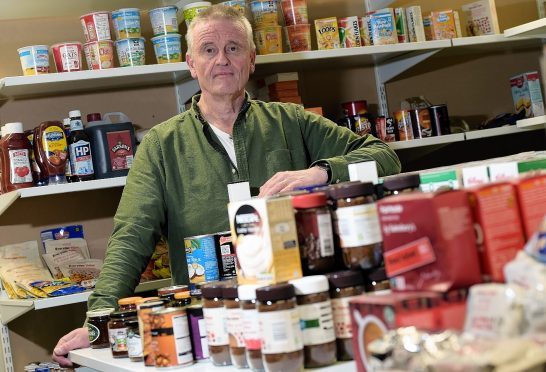Public donations to north-east food banks have plummeted by 75%, slashing supplies at a time of record demand.
Community Food Initiatives North East – one of several organisations working to help people in need – expects to provide more than 10,000 emergency packs in the city this year for the first time in its history.
However, since June, the charity has moved from a weekly to a fortnightly distribution after stocks of staples such as tinned meals ran low.
Chief executive Dave Simmers said the slump was not surprising when more and more workers were fearful of being “next for the chop”.
But he appealed to businesses to step up food drives in workplaces in an effort to ensure other families did not have to go hungry.
In 2015, CFINE received 71 tonnes of supplies from public and corporate sources, which Mr Simmers hailed as a “fantastic contribution”.
But, in the first eight months of 2016, just 11.8 tonnes has been collected, a situation which has caused problems for those trying to fill parcels.
The bulk of the charity’s food – 266 tonnes so far this year, already surpassing last year’s total – comes from its Fare Share scheme.
It collects surplus produce from the food industry and distributes it to 156 organisations across the north east.
This year’s total is the equivalent of more than 630,000 meals.
But much of that is perishable items such as chickens and joints of meat, which is used to cook meals for those in need rather than being given out.
Mr Simmers added that the food coming in remained “a fantastically compassionate response”, but that it had dramatically “tailed off”.
He added the problem was being compounded because demand for help from food banks was becoming increasingly desperate across the region.
He said: “If you look at the oil downturn, there are huge numbers of people being laid off. That reduces their capacity to give to food drives.
“In a situation where so many people are feeling vulnerable themselves, a food drive becomes a more difficult thing to deliver. People don’t know if they are the next for the chop.
“If the general public or a business want to organise food drives, we would be happy to help support them.”
“What we are seeing, day to day, is people in the most dire circumstances, really facing poverty.”
“We do anticipate, regrettably with confidence, that the numbers will continue to increase.
“More than ever, the need is there in our city and the wider region and donations are always welcome.”
Describing welfare reforms as one of the main reasons for the escalating demand, he urged the governments at Westminster and Holyrood to act urgently to rescue people from poverty.
Mr Simmers added that the amount paid to the unemployed was tight “even with the best will in the world and the best budgeting.”
